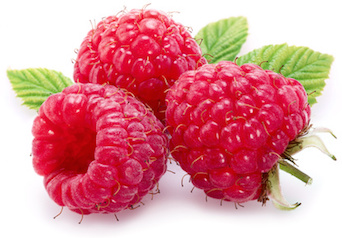
Health Benefits:
Aids in digestion
Anti aging
Anti fungal
Combats fatigue
Fights free radicals
Helps cure dysentary
Improves hair skin and nails
Increases stamina
May reduce anxiety
May reduce risk of diabetes
Promotes heart health
Provides energy
Relieves PMS
Nutrition:
Serving size: 1 cup; Calories: 65; Fat: .5g; Cholesterol: 0mg; Sodium: 1mg; Carbs: 15g; Fiber:8g; Sugars: 5g; Protein: 1.5g; Potassium: 5%DV; Vitamin A: 0%DV; Vitamin C: 53%DV; Calcium: 3%DV; Iron: 4%DV
Did You Know?
- Raspberries can be red, black, purple, and golden in color!
- Raspberries should be kept in the refrigerator. They will usually last a few days in the refrigerator, and up to one year in the freezer.
- Raspberries rank in the top 10 antioxidant-high fruits and vegetables!
- Raspberries are high in potassium, vitamin A and calciu
Ways to Eat:
- Raw
- In a salad
- Jellied
- In baked goods
- Cold or hot cereals
- Smoothie
Farming Trivia:
- Most likely native to Asia, wild raspberries have been eaten since prehistoric times. Cultivation began in England and France, probably in the 1600s
- Traditional folklore recommends the use of raspberry leaf tea for pregnant women, it as it is suggested it may shorten the second stage of labor. But should be avoided in the first trimester
- The whole berry is an aggregate of small "drupe" fruits
Note: Always consult a physician for any specific health questions and concerns. Some of this information may be subject to change should there be any new findings from Federal Health Administration (FHA), Food & Drug Administration (FDA), American Medical Association (AMA), American Cancer Society (ACS), and / or other leading food, nutrition and medical advisors.

